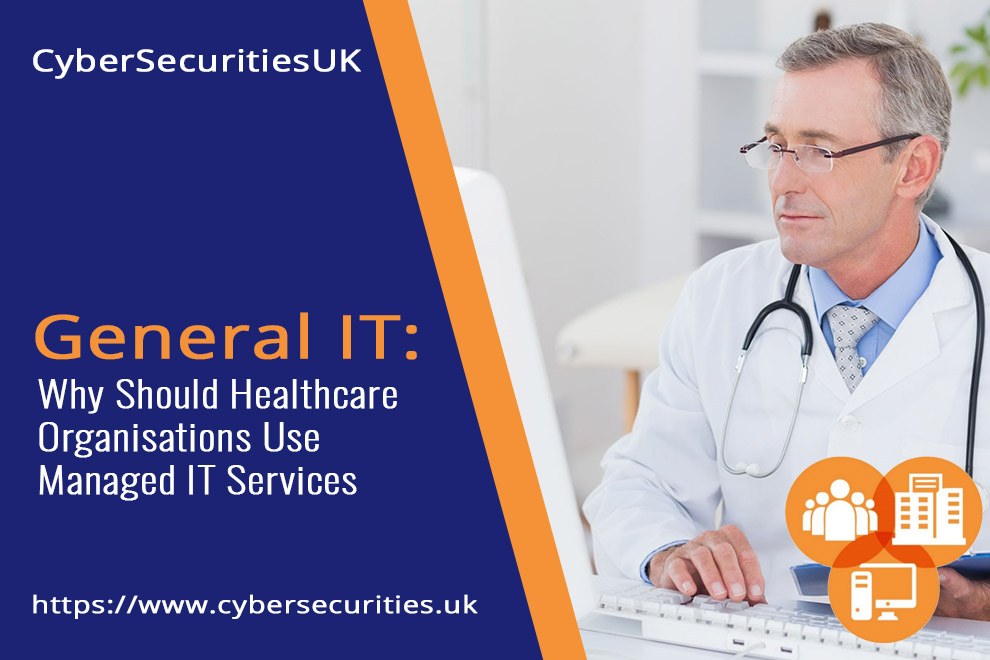Introduction
Healthcare organisations benefit significantly from digitising patient health information as it helps improve their ability to care for patients. However, this level of care has become heavily dependent on accessing the patients’ data, which often gets threatened by downtime, cyber threats, and tampering.
In this case, data accessibility and integrity need to be harnessed. Working with a managed IT service provider can help healthcare organisations make the most out of their technology while dealing with mobility, scalability, and compliance.
Here are the reasons why healthcare providers should use a managed services provider:
Compliance
Hackers have targeted healthcare organisations for their sensitive patient data and intellectual property. The most common cyber attacks come from advanced persistent threat groups that conduct covert attacks. They snoop around healthcare computer systems to steal, spy, and damage the organisations.
Managed service providers (MSPs) can also give healthcare providers the cyber security they need against cyber attackers. Instead of the in-house IT team fielding out thousands of hacking attempts daily on their own, they can get the expertise of a group of IT professionals focused on strengthening healthcare data security.
It is also important to note that any organisation handling patients living in the EU have to work towards GDPR compliance. This might be something that in-house IT personnel cannot do on their own. Fortunately, experienced MSPs can ensure IT security for healthcare provider users. They can help you get certified with the Cyber Essentials scheme so you can avoid hefty fines and prepare you for compliance with GDPR.
Workforce Mobility
Healthcare organisations can use mobile technologies and promote workforce mobility, but this also comes with its risks. Patient health information on mobile devices is at high risk of being breached if not correctly handled.
But workforce mobility in healthcare has given way to improved patient engagement and increased employee satisfaction. It has also reduced the expenses for in-house infrastructure and office space.
Organisations can still enjoy mobility by using a cloud-based infrastructure to store and secure their health information if they count on managed IT consulting companies. These IT firms can help healthcare employees enjoy easy accessibility to their health information anywhere without worrying about a data breach and similar risks.
Better Patient Care
Technology can make the patients’ lives better, which shows how a well-managed technology environment can boost the engagement between healthcare employees and patients.
Instead of sticking to the old-school way of keeping and storing patient records, MSPs can help healthcare organisations migrate patient records and critical systems to a new and mobility-supportive environment that is still secure and compliant with regulations.
With the aid of IT consulting services, which improve the technology used by healthcare organisations, they can lighten doctors’ and nurses’ workload. A good example would be reducing their time spent on charting as they promote paperless documentation of providing patient care.
Technology is also used to lessen issues with medication errors. Online alerts and secure emails can serve as accurate and timely reminders for patients to take their medications. MSPs can also help ensure patient information accessibility, allowing doctors to have a clearer picture of the patient’s history and reducing the risk of misdiagnoses, wrong prescription, or ineffective patient care strategies.
With a properly managed IT infrastructure, healthcare technology can be used to improve communication between healthcare organisations and facilities. It will be easier for medical teams to work together in treating patients.
Scalability
Healthcare organisations working with MSPs don’t have to deal with growth limitations anymore. They can now enjoy cost-effective technology that will still allow them to scale their operations. This means they can afford to handle more patients and train more medical staff without compromising patient care quality. MSPs can develop a cloud-hosted IT infrastructure that will grow or scale down, as needed by the organisation.
Fast Response Times
Reliable MSPs guarantee quick response times. If the organisation encounters a problem with any part of their infrastructure, the firm can be reached round-the-clock.
If the network suddenly goes down, this could hinder the medical staff from providing proper care. The last thing the organisation needs is to leave their patients hanging because their system is down.
MSPs can fix the issue at the earliest time possible. They even have systems in place to prevent downtimes from happening in the first place. They also have backup plans for whatever problem the IT network may encounter.
Business Continuity
In case of an attack, natural disaster, power outage, or similar happenings, MSPs can help healthcare organisations recover faster.
They can help the organisation develop a disaster recovery plan that aims to restore IT infrastructure and systems after a catastrophe. MSPs can identify the organisation’s essential IT functions and the role of each function to business operations. Managed IT companies can walk the in-house team through all the business continuity preparations. They can help the team develop accurate documentation of data backup and recovery procedures, the network landscape, and document system dependencies, among others.
Controlled IT Costs
Cost savings are among the most significant reasons healthcare organisations should hire IT consulting firms. By adopting their services, they can cut their operating costs by 20% to 45% by using the right tools.
Healthcare organisations, though, have to do their part in maximising these savings by upgrading existing systems, investing in new technologies, and applying best-in-class tools, technology, and processes. They also need to make full use of the MSPs’ offsite and onsite support and shared services.
By partnering with MSPs, healthcare organisations can save on penalties from compliance violations.
MSPs also get paid upfront or at least charge organisations a fixed cost. This makes budgeting for IT expenses much easier. This also saves healthcare organisations from paying the separate costs of maintaining the servers, networks, IT hardware and software, databases, phone systems, printers, and the rest of the IT infrastructure.
Hiring a managed IT service company also means paying to maintain the organisation’s cloud, virtualisation, storage needs, and more. Working with one may even mean getting a team to ensure security, business continuity, and system backups.
With increased security from MSPs, healthcare organisations reduce the risk of attacks from viruses and malware. This means saving themselves from losing time, data, money, and reputation, which could happen if they get hacked.
Getting proactive IT services from MSPs also saves organisations money, as they don’t have to pay for expensive data recovery expenses and repairs. They also don’t need to deal with the costly repercussions of an inadequate IT infrastructure and unreliable network, which could lose the trust of their patients and the rest of the medical community.
Conclusion
There are so many reasons why healthcare organisations need to work with managed IT service providers. From complying with regulations to reducing their IT budget, all of which can boost their overall ability to care for more patients without compromising the quality of the medical services.



